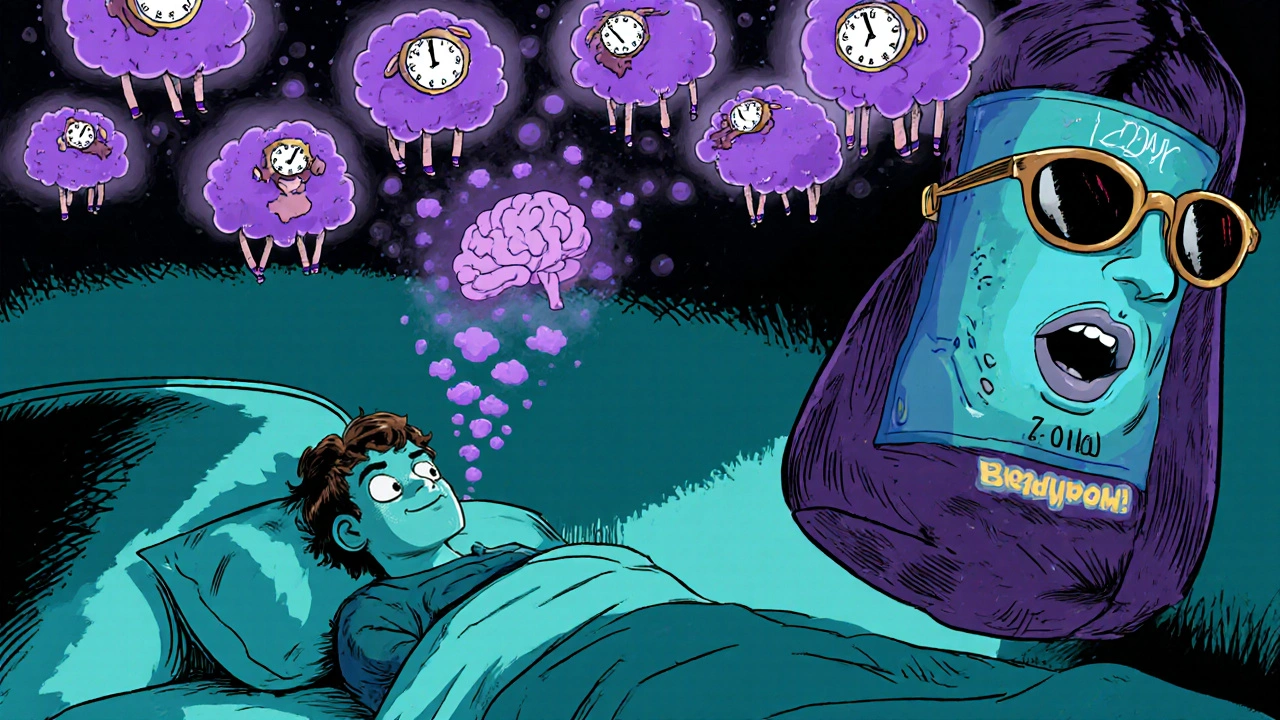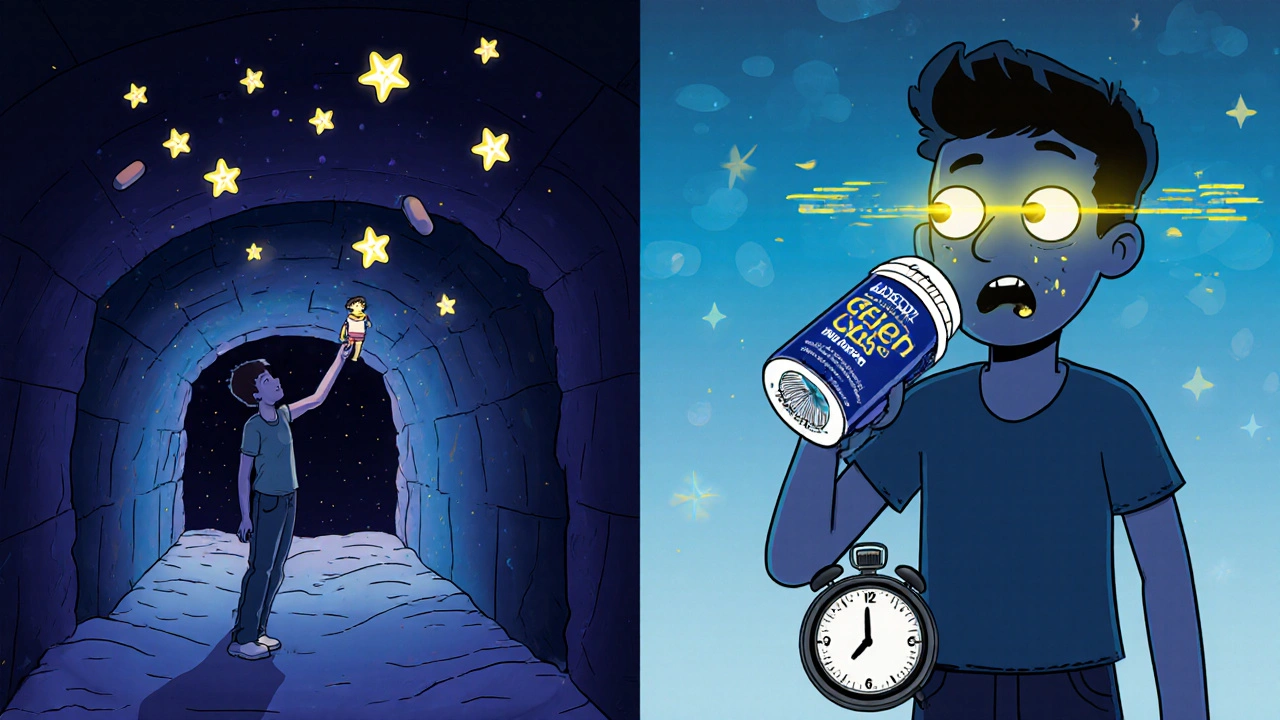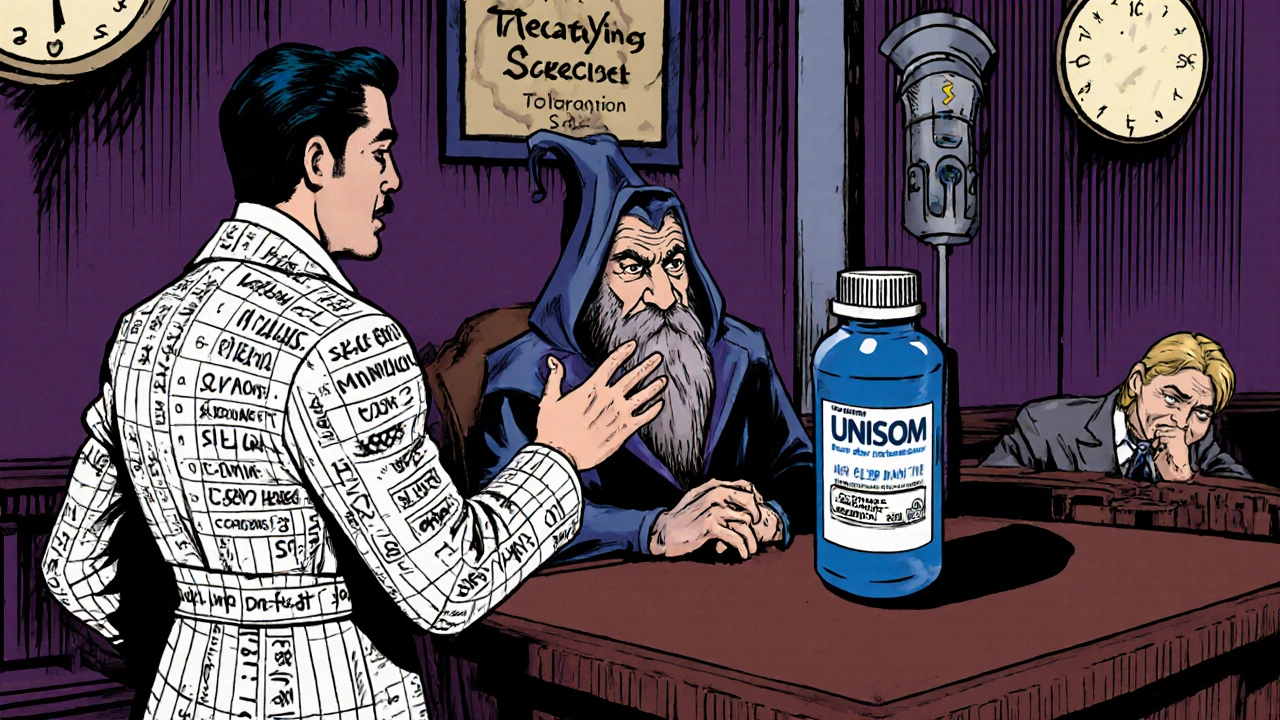 Oct, 28 2025
Oct, 28 2025
If you’ve ever stared at the ceiling at 2 a.m., counting sheep that refuse to show up, you know how brutal insomnia can be. Unisom, with its active ingredient diphenhydramine, has been a go-to for years - cheap, easy to find, and promises quick sleep. But does it still hold up in 2025? And are there better, safer, or more effective options out there?
What is Unisom, really?
Unisom SleepTabs contain diphenhydramine an antihistamine originally developed to treat allergies, but now widely used as a short-term sleep aid. It’s the same chemical found in Benadryl, just repackaged for nighttime use. Diphenhydramine works by blocking histamine in the brain, which causes drowsiness. That’s it. No magic. No sleep cycle regulation. Just sedation.
It kicks in within 20 to 30 minutes and lasts about 4 to 6 hours. For someone who just needs to nod off after a stressful day, it can feel like a lifesaver. But here’s the catch: it doesn’t improve sleep quality. You might fall asleep faster, but your brain never gets into deep, restorative stages. You wake up groggy. Sometimes worse than before.
And if you use it regularly - say, more than two weeks in a row - your body builds tolerance. You need more to get the same effect. Then you start experiencing side effects: dry mouth, blurred vision, constipation, next-day brain fog, and even increased risk of falls in older adults. The American Academy of Sleep Medicine warns against using antihistamines like diphenhydramine for chronic insomnia.
Alternatives to Unisom: What Actually Helps?
Let’s cut through the noise. Not all sleep aids are created equal. Here are the most common alternatives - and what science says about them.
Doxylamine (Unisom SleepGels)
Unisom also sells SleepGels, which contain doxylamine another antihistamine, slightly stronger and longer-lasting than diphenhydramine. It’s similar to diphenhydramine in mechanism but lasts 6 to 8 hours. Some people find it more effective for staying asleep through the night.
But here’s the thing: it’s still an antihistamine. Same side effects. Same risk of tolerance. Same lack of real sleep improvement. If you’re switching from SleepTabs to SleepGels hoping for a breakthrough, you’re just swapping one sedative for another.
Melatonin
Melatonin a natural hormone your body produces to signal it’s time to sleep. Unlike diphenhydramine, melatonin doesn’t knock you out. It gently nudges your internal clock.
It’s most effective for people with circadian rhythm issues - jet lag, shift work, delayed sleep phase. A 2023 meta-analysis in the Journal of Clinical Sleep Medicine found melatonin reduced sleep onset time by about 7 minutes on average. That’s not huge, but it’s real. And it doesn’t cause next-day grogginess or dependency.
Dosage matters. Most over-the-counter products contain 3-10 mg. But studies show 0.3-1 mg is often enough. More isn’t better. High doses can make you feel hungover the next morning.
Valerian Root
Valerian is a herbal supplement that’s been used for sleep for centuries. It works by increasing GABA, a calming neurotransmitter in the brain - similar to how some prescription sleep drugs work, but much milder.
A 2021 review in Complementary Therapies in Medicine found valerian improved sleep quality in about 40% of users, with minimal side effects. But it takes time. You need to take it daily for 2-4 weeks before noticing results. Not ideal if you need help tonight.
It’s safe for most people, but can interact with alcohol, sedatives, or anxiety meds. Also, taste is awful. Some brands mix it with peppermint to make it bearable.
Cognitive Behavioral Therapy for Insomnia (CBT-I)
This is the gold standard. Not a pill. Not a supplement. A structured, evidence-based program that reteaches your brain how to sleep.
CBT-I targets the thoughts and behaviors that keep you awake - worrying about sleep, lying in bed awake for hours, inconsistent routines. It includes sleep restriction, stimulus control, relaxation training, and cognitive restructuring.
A 2022 study in The Lancet followed 1,000 people with chronic insomnia for a year. Those who did CBT-I improved sleep quality more than those on any sleep medication, including benzodiazepines. And the benefits lasted long after treatment ended.
It’s not quick. But it’s the only treatment that cures insomnia instead of masking it.
Prescription Options (Z-drugs, Low-Dose Antidepressants)
If OTC sleep aids aren’t working, and CBT-I isn’t accessible, doctors may prescribe:
- Zolpidem (Ambien) - faster acting than diphenhydramine, but carries risk of sleepwalking, memory issues, and dependency.
- Eszopiclone (Lunesta) - longer duration, better for staying asleep, but still not ideal for long-term use.
- Mirtazapine (Remeron) - an antidepressant with strong sedative effects. Sometimes used off-label for insomnia, especially when depression is also present.
All of these require a prescription. They’re not safer than Unisom - just more regulated. They’re meant for short-term use, not nightly reliance.
Side-by-Side Comparison: Unisom vs. Alternatives
| Option | How It Works | Onset Time | Duration | Next-Day Drowsiness? | Dependence Risk | Best For |
|---|---|---|---|---|---|---|
| Unisom (Diphenhydramine) | Antihistamine - sedates brain | 20-30 min | 4-6 hrs | Yes | High | Occasional sleeplessness |
| Unisom SleepGels (Doxylamine) | Stronger antihistamine | 20-30 min | 6-8 hrs | Yes | High | Staying asleep |
| Melatonin | Resets body clock | 30-60 min | 1-5 hrs | Minimal | None | Jet lag, circadian issues |
| Valerian Root | Boosts GABA | 1-2 hrs | 6-8 hrs | Low | Very low | Chronic mild insomnia |
| CBT-I | Behavioral retraining | 2-6 weeks | Long-term | No | None | Chronic insomnia |

When to Avoid Unisom (and Why)
Unisom might seem harmless, but it’s not safe for everyone.
- Over 65? Antihistamines increase fall risk and confusion. The Beers Criteria lists diphenhydramine as potentially inappropriate for seniors.
- Have glaucoma, enlarged prostate, or urinary issues? Diphenhydramine can worsen these.
- Take other sedatives or antidepressants? Risk of dangerous interactions.
- Need to drive or operate machinery? Drowsiness doesn’t wear off just because you’re awake.
- Have liver disease? Your body can’t break it down properly.
If you’re using Unisom more than once a week, you’re not treating insomnia - you’re masking it. And masking is dangerous. It lets the real problem grow.
What Should You Do Instead?
Here’s a simple, actionable plan:
- Try melatonin first. Start with 0.5-1 mg, 30 minutes before bed. No need to take it every night.
- Fix your sleep hygiene. No screens an hour before bed. Keep your room cool and dark. Get up at the same time every day - even weekends.
- Use valerian if you’re patient. Take it daily for 3 weeks. Don’t expect miracles on day one.
- Book a CBT-I program. Many are now available online through apps like Somryst or Sleepio. Some are covered by insurance.
- See a doctor if it’s been over a month. You might have sleep apnea, restless legs, or anxiety - things Unisom can’t fix.
Unisom isn’t evil. It’s just outdated. We’ve got better tools now. Why keep using a hammer when you have a screwdriver?

Frequently Asked Questions
Is Unisom safe for long-term use?
No. Long-term use of diphenhydramine increases risk of cognitive decline, especially in older adults. It also leads to tolerance - meaning you need higher doses over time. The American Academy of Sleep Medicine recommends avoiding antihistamines for chronic insomnia.
Can I take melatonin and Unisom together?
Don’t. Combining melatonin with diphenhydramine increases sedation without improving sleep quality. You’re stacking two sedatives, which raises your risk of next-day grogginess, dizziness, and impaired coordination. Use one or the other - not both.
Does valerian root really work?
Yes, but slowly. Studies show it improves sleep quality after 2-4 weeks of daily use. It doesn’t make you fall asleep instantly like Unisom. If you need help tonight, it won’t work. But if you’ve been struggling for months, it’s one of the safest long-term options.
Is CBT-I better than sleeping pills?
Yes. Multiple studies, including one published in The Lancet, show CBT-I is more effective than any sleep medication for long-term insomnia relief. It doesn’t just help you sleep - it rewires your brain to sleep naturally. And the results last years after treatment ends.
Why do doctors still prescribe Unisom?
Many doctors prescribe it because it’s cheap, easy, and patients ask for it. But that doesn’t mean it’s the right choice. Increasingly, sleep specialists are steering patients toward CBT-I and melatonin. Unisom is becoming a relic - like recommending aspirin for chronic migraines.
Next Steps
If you’re tired of relying on Unisom, start here:
- Download a sleep tracker app (like Sleep Cycle or Apple Health) for one week. See your actual sleep patterns.
- Try 0.5 mg melatonin for three nights. No more.
- Set a consistent wake-up time - no exceptions.
- Search for a certified CBT-I provider online. Many offer virtual sessions.
Sleep isn’t something you take. It’s something you build. And you don’t need a pill to do it.

Alexa Ara
October 29, 2025 AT 15:58Love this breakdown! I switched from Unisom to 0.5mg melatonin last year and honestly? My mornings don’t feel like I got hit by a truck anymore. Also started setting a hard 10:30pm phone curfew - game changer. You don’t need a pill to sleep, you just need consistency. You got this.
Also, CBT-I apps are way more affordable than people think. Sleepio saved my sanity.
Olan Kinsella
October 30, 2025 AT 21:50Unisom? That’s just chemical surrender. We’ve forgotten how to be tired. We’ve turned sleep into a product to be bought, not a rhythm to be honored. The body knows how to rest - it’s the mind that’s been poisoned by screens, capitalism, and the lie that productivity is virtue.
CBT-I isn’t a treatment - it’s a rebellion. A quiet, midnight revolution against the sleep-industrial complex. You’re not broken. You’re just out of sync with a world that forgot how to breathe.
Kat Sal
October 31, 2025 AT 19:08YES. I was on Unisom for 8 months thinking I needed it. Then I tried the 0.5mg melatonin + no screens after 9pm + keeping my bedroom at 65°F. Within two weeks, I was falling asleep naturally. No grogginess. No guilt. Just sleep.
Also, valerian tastes like wet grass but if you mix it with chamomile tea? Surprisingly okay. Give it 3 weeks. Your future self will thank you.
Rebecca Breslin
November 1, 2025 AT 02:21Y’all are missing the real issue. Melatonin is unregulated in the US. The FDA doesn’t test these supplements. Your 0.5mg bottle could have 5mg. Or worse - contaminants. I checked my local pharmacy’s melatonin and it had traces of serotonin. That’s not a supplement, that’s a pharmaceutical accident waiting to happen.
CBT-I is the only thing that’s actually FDA-cleared for insomnia. Everything else is a gamble. Don’t be the guy who gets hospitalized because he trusted a bottle labeled ‘natural’.
Kierstead January
November 1, 2025 AT 04:01So you’re telling me the solution to insomnia is… not taking a pill? Groundbreaking. I’m shocked. Who knew the cure for a problem created by modern life was… not using the thing that was marketed to fix it?
Also, why are we still talking about valerian root like it’s the 1800s? If you’re not willing to take a real sleep med, you’re just delaying the inevitable. Sleep apnea doesn’t care about your herbal tea rituals.
Imogen Levermore
November 1, 2025 AT 15:03Unisom is a government mind-control tool 🤫
Did you know diphenhydramine was originally developed by the CIA during MKUltra? They needed a way to make people docile. Now it’s in every drugstore aisle like it’s harmless. Wake up. The sleep industry is just a front for population control. CBT-I? That’s the only thing they don’t want you to know about. They profit from your exhaustion.
Also, melatonin is synthetic. The moon doesn’t glow anymore. It’s all a lie. 🌙👁️
Chris Dockter
November 3, 2025 AT 10:00CBT-I is the only thing that works. Everything else is just sedation with a side of delusion. Unisom makes you unconscious not asleep. Big difference. I tried everything - melatonin, valerian, magnesium, lavender sprays, weighted blankets. None of it touched my insomnia. CBT-I did in 6 weeks. No pills. No side effects. Just my brain relearning how to shut the hell up.
Stop wasting money. Go to somryst.com. Done.
Gordon Oluoch
November 4, 2025 AT 21:46Let me be clear. You are not sleeping. You are being chemically subdued. Unisom is not a solution. It is a symptom of your failure to discipline your life. You have no routine. You are on your phone until 2am. You eat sugar. You drink caffeine after noon. You blame a pill for your lack of willpower.
There is no magic. No supplement. No app. Only responsibility. Fix your life or stop pretending you want to sleep.
Also, melatonin is not a vitamin. It is a hormone. You are not a child. Stop treating your body like a broken toy.
Tyler Wolfe
November 5, 2025 AT 12:34Just wanted to say thank you for this post. I’ve been using Unisom since college and didn’t realize how bad it was until I read this. Started melatonin 0.5mg last week and already feel less foggy. Also stopped checking email after 9pm. Small changes, but it’s working.
CBT-I sounds scary but I’m signing up for the free trial this week. You’re right - sleep isn’t something you take. It’s something you build. And I’m ready to start.
Neil Mason
November 6, 2025 AT 22:44As a Canadian, I’ll add - we actually have better regulation on OTC sleep aids here. Melatonin is prescription-only in Canada for adults over 18. It’s not a supplement. It’s a hormone. That’s why we don’t have the same mess as the US.
Also, CBT-I is covered by most provincial health plans now. You don’t need to pay out of pocket. Check with your local clinic. It’s not just ‘therapy’ - it’s a medical intervention. And it’s effective. Trust the science, not the Amazon reviews.